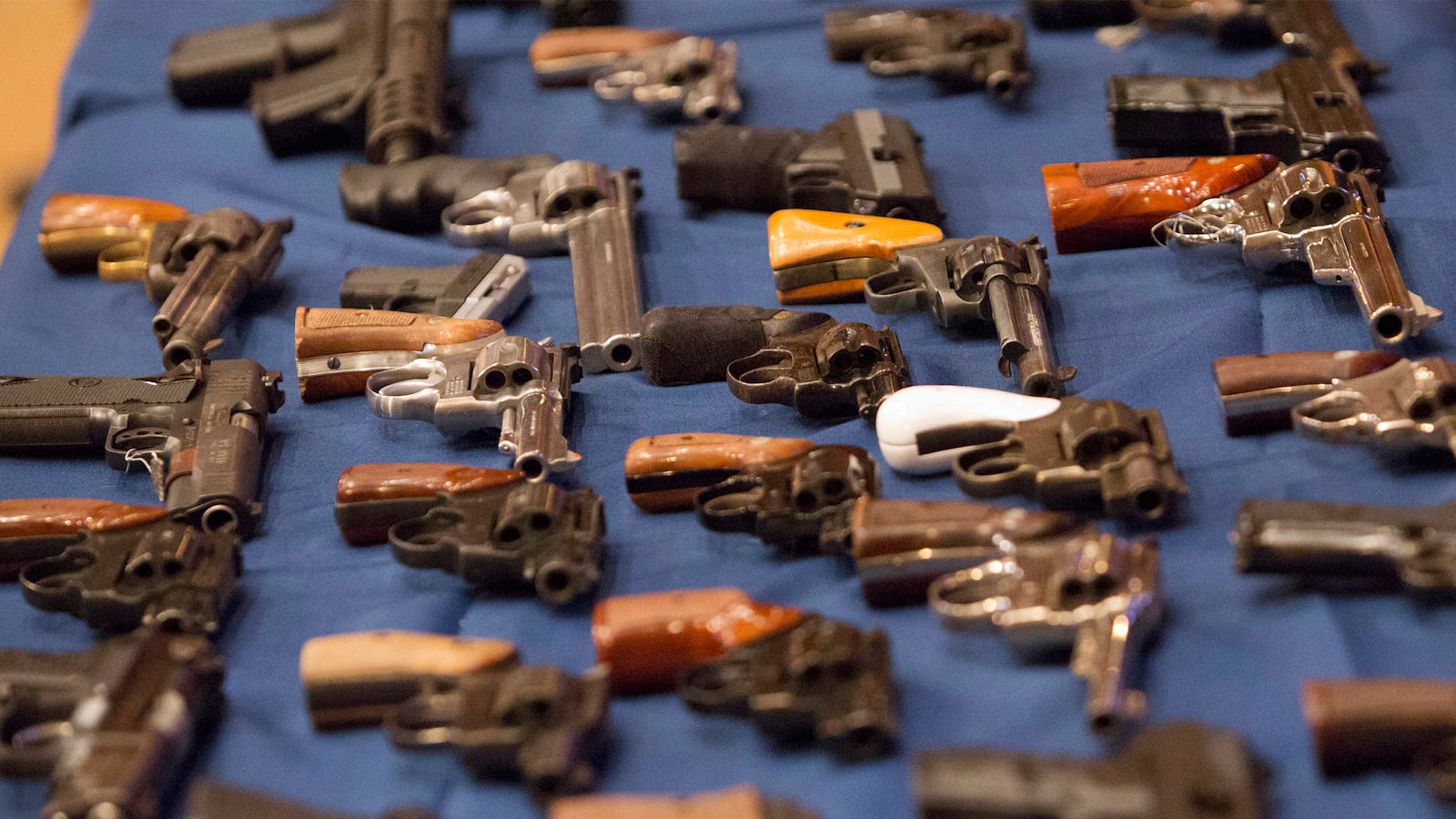Thirty thousand people are killed by firearms each year in the United States, an astronomically high figure for a developed Western country not in a state of civil war.
President Obama reminds Americans of this sad statistic with depressing regularity, and he did so again last month after a mass shooting in Oregon took the lives of nine people. “We know there are ways to prevent it,” the president said.
We do indeed know there are “ways” to stop gun violence in the United States, yet we adamantly refuse to name them. The perennial “national conversation” about guns is predictably stale because its contestants—those favoring a largely unfettered right to personal gun ownership and those opposing it—are talking past each other. Prevarication characterizes the debate, as each side adheres to a core principle that, for reasons of propriety and political calculation, it is unwilling to admit publicly.
For the gun-control side, the unspoken belief is that nothing short of all out confiscation will have an appreciable effect on decreasing gun deaths. Then again, it’s not that unspoken—gun-control advocates just prefer tergiversation to clarity. Democratic candidates, officeholders, and liberal websites frequently invoke the example of Australia, for example. After a 1996 shooting rampage killed 35 people, the Australian government outlawed an array of firearms and instituted a compulsory buyback program that effectively eliminated private gun ownership. Since then, gun violence has dropped precipitously.
Rarely in American gun-control advocates’ references to the Australian policy, however, do they acknowledge that the program amounted to confiscation. “When Australia had a mass killing—I think it was in Tasmania—about 25 years ago, it was just so shocking, the entire country said, ‘Well, we’re going to completely change our gun laws,’ and they did,” Obama said after a June shooting in a Charleston church killed nine people. Curiously, the president omitted just what “change” the people of Australia decided to implement.
Democratic presidential candidate Hillary Clinton told an audience in New Hampshire last month that “Australia is a good example” of gun-control laws, so much so that it “would be worth considering” the Antipodean solution here in the United States. She, too, neglected to mention the obligatory nature of the gun buyback scheme.
The following week, after having explicitly praised gun confiscation, however, she mocked the National Rifle Association for supposedly scaring its members into thinking that “they’re the only thing that’s going to stop the black helicopters from landing in the front yard and people’s guns being seized.”
Holding up Australia as a model of sensible gun policy without mentioning how that government forced its citizens to turn over their weapons is like praising Chinese population-control efforts without mentioning the one-child policy.
These advocates of gun control note the efficacy of the confiscations they only hint at while sidestepping the fact that none of the restrictive measures they explicitly endorse—banning so-called assault weapons, limiting the size of magazines, or requiring background checks on the private transfer of firearms—would have prevented these mass shootings, committed as they were by individuals using legally obtained firearms that did not fall under the definition of “assault weapon.”
That the perpetrators violate a host of well-intentioned laws, like bringing a weapon onto a “gun-free zone,” just goes to show how difficult it is to eliminate such crimes when people are determined to inflict harm in a society so permeated with guns.
But if it would seem that confiscation on a massive scale is the only way to solve American gun violence, why don’t we talk about it more?
To understand why, we must first recognize the incompatible nature of the values at stake. Those advocating for stricter gun laws believe that the harm produced by private gun possession outweighs whatever benefits it entails.
Writing in the aftermath of the 2012 mass shooting at Sandy Hook Elementary School in Newtown, Connecticut, certainly the most horrific in recent American history, Gary Wills likened this country’s enthrallment to guns as the equivalent of a perpetual human offering to the biblical Moloch, “the sacrifice we as a culture made, and continually make, to our demonic god.” America’s decades-long debate over guns boils down to this: Gun-rights advocates are willing to make that sacrifice for their right to bear arms; gun-control advocates think it’s too high a price.
Which leads to the second unspoken truth of America’s gun debate, that held by the pro-gun side: Americans should be willing to tolerate tens of thousands of gun deaths per year as the cost of the inalienable right, as enumerated in the Second Amendment of the U.S. Constitution, to bear arms.
“Guns don’t kill people; people kill people,” goes the proverbial pro-gun mantra. That is, of course, true, but a whole lot fewer people would be killed in the United States were there not some 350 million guns—more than one for every man, woman, and child)—in private circulation. (Stabbings, for instance, are eight times less likely to kill than a gunshot wound.)
What gun-rights advocates necessarily believe but choose not to say is that the right to bear arms takes precedence over the negative externalities of ensuring that right. This attitude toward the Second Amendment follows from a similar, more widely accepted understating of the freedom granted by the First Amendment. Just as we must tolerate the airing of all sorts of unpopular opinions as the consequence of unfettered free speech, so is gun crime the inevitable cost of living in a free society.
Furthering the analogy, mass shootings, in the eyes of most gun owners, are akin to pornography, or public demonstrations by the Ku Klux Klan: the unwanted side effects of living in a country that maximizes individual liberty more than any other on Earth. Americans’ relationship to guns, in this view, is not unlike our use of technologies that cause pollution. No serious person would advocate eliminating cars and airplanes because they sully the earth, so why would we ban guns simply because they’re occasionally used in ways we don’t approve of?
Likening tragedies such as Sandy Hook to the hurt feelings caused by hateful speech or air pollution—the unpleasant but hardly overwhelming detritus of freedom—would strike many people as insensitive. That is why you don’t hear supporters of gun rights make such comparisons. Instead, they propose measures other than restrictions on gun ownership, like firearm safety training and increased resources for mental-health services.
But like the policies endorsed by gun-control advocates that fall short of confiscation, so too are these measures mere Band-Aids to what is the inevitable result of the Second Amendment. And just as the political exigencies of acknowledging the societal price imposed by that amendment are too stark for its devotees to make, so too do gun-control advocates resist stating their fundamental opposition to this constitutional right. That’s because the prospect of confiscation—as much as it might, theoretically, reduce drastically or even eliminate gun crime altogether—is simply impossible in the United States.
On a practical level, Australia, that paragon of successful gun control, confiscated just 650,000 guns, an infinitesimally small amount compared to the number of weapons in the U.S.
A more fundamental obstacle to successful confiscation, however, is Americans’ reverence for gun rights. This devotion—aptly illustrated by the not insubstantial public support expressed for presidential candidate Ben Carson’s insistence that Hitler’s extermination of German Jews “would have been greatly diminished” had the Nazi leader not disarmed them first—would never permit anything remotely resembling the wide-scale seizure of privately owned firearms.
Second Amendment enthusiasts are fond of arguing that gun rights are enshrined in the Constitution not only for the sake of hunters or people who want to protect their homes and businesses from criminals, but also to allow the population to resist an overreaching government. If federal agents came to round up firearms, many gun owners would be prepared to shoot back. Clinton can joke all she likes about Americans fearing “black helicopters” taking their guns away, but it is no exaggeration to suggest that civil war could erupt on American soil were the U.S. government to attempt anything remotely resembling what was done in Australia.
And so Americans are condemned to engage endlessly in futile argument—futile thanks to the legal enshrinement of private gun ownership in our founding document, as well as to a refusal to state clearly our mutually exclusive convictions: that the intrinsic cost of this right is tens of thousands of unwanted deaths and that the only way to stop these deaths is outright gun confiscation.
Perhaps, in a perfect world, the United States would never have had the Second Amendment. But such a country—one not forged in armed revolution against arbitrary rule from afar and founded upon the principle of individual liberty—would not be the United States, with all its virtues and vices. For Americans like myself with no attachment to guns but who respect the vast majority of responsible gun owners who exercise their right to own them, one can only observe gun violence, and the debate surrounding it, with a sense of dreary resignation.






